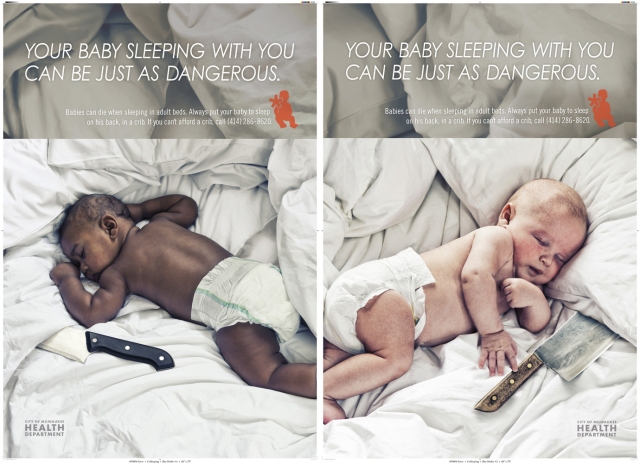New Jersey’s Proposed Anti-Milksharing Campaign—the Next Attack on Parental Informed Choice?
12/13/2013A proposed bill (NJ A3702) in New Jersey has its sights on the informal milksharing community. This bill:
“Establishes public awareness campaign advising pregnant women, new parents, and women who are breast feeding about dangers of casual milk sharing.”
What?!
After I read this bill, I immediately flashed back to Milwaukee’s infamous anti-bedsharing campaign from 2011. Will New Jersey begin posting ads similar to these about milksharing?The above ads were Milwaukee’s attempt to reduce their infant mortality rate. However, campaigns like these go against what is biologically normal and ignore research and evidence. Bedsharing can be done safely, but the Milwaukee Health Department chose to just create a blanket campaign to admonish the practice all together.
This New Jersey milksharing bill is essentially another scaremongering tactic. Assemblywoman Pamela Lampitt, who sponsored this bill, says this is about healthy babies, but the only thing a bill like this will do is push parents and caregivers away from seeking out donor milk, which has been shown time and time again to be beneficial for children. She even failed to consult with the milksharing community and researchers.
New Jersey plans to discuss only the dangers of milksharing while providing no other information to parents and caregivers. In Dr. Karleen D. Gribble’s 2012 paper, “Milk sharing and formula feeding: Infant feeding risks in comparative perspective?”, she discusses issues with campaigns like this:
“There are risks associated with all forms of infant feeding, including breastfeeding and the use of manufactured infant formulas. However, health authorities do not warn against using formula or breastfeeding; they provide guidance on how to manage risk.”
So, why is New Jersey focusing only on informal milksharing risks? Despite evidence pointing to how beneficial breastmilk is, their state officials are ignoring the research and outright trying to condemn the practice of milksharing based mostly on cultural beliefs that sharing breastmilk is dangerous and must be controlled. This proposed campaign is patronizing to parents. It assumes that caregivers are not capable of ensuring the safety of their children. Humans have practiced milksharing in various forms (like wetnursing) for thousands of years and this practice is not stopping anytime soon. Parents do not seek out donor breastmilk indiscriminately. The milksharing community operates on the basis of informed choice where parents are educated on all risks and benefits of using donor milk. The communities advise that donors and recipients operate under full disclosure. Donors and recipients routinely screen each other to ensure they are a good match. This includes getting medical histories, communication about lifestyle and habits, and disclosing any medication the donor may be using. Donors also want to learn about the recipient family and what their needs are. Oftentimes, these connections are very strong and develop into long lasting friendships.Gribble offers an excellent conclusion in her paper from 2011, “Milk sharing: from private practice to public pursuit” that helps summarize the concerns with bill NJ A3702:“Mothers are leading in this initiative. The public health community has a choice: stay on the side-lines or move to engage, to assist those who are involved in milk sharing to make it as safe as possible. We appeal for engagement in the belief that milk sharing will happen regardless of denunciations; that its level of risk is manageable; and that there are greater intractable risks for babies who do not receive breast milk. We believe that if undertaken, managed and evaluated appropriately, this made-by-mothers model shows considerable potential for expanding the world’s supply of human milk and improving the health of children.”
New Jersey Assemblywoman Lampitt, please reevaluate the objectives in this bill. Do you truly believe that the scare tactics outlined will keep babies safe? Can you see that this would create a barrier that ultimately keeps children from receiving species specific food that is optimal for their development? Please do not let this proposed campaign be the next Milwaukee anti-cosleeping crusade.Want to help the New Jersey milksharing community say “no” to this bill? Sign the petition here:Support NJ milksharing families: Stop Bill A3702Stay up to date by following along on Facebook:Friends of New Jersey MilksharingTo better understand how milksharing is done safely, please check out the two biggest milksharing communities:
Human Milk for Human Babies (HM4HB) FAQ section:http://hm4hb.net/faq/and
Eats on Feets: Four Pillars of Safe Breast Milk Sharing: http://eatsonfeets.org/#fourPillars
To comment, head on over to Rachelle Lesteshen's Unlatched blog.












